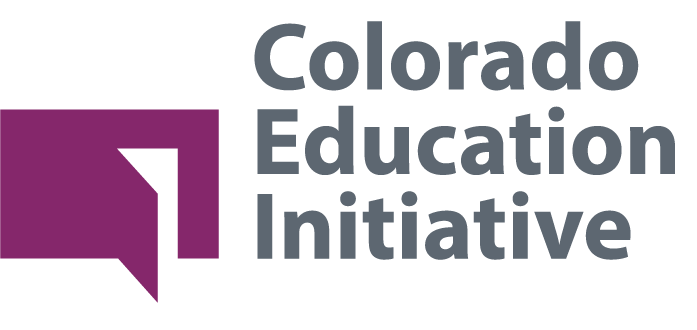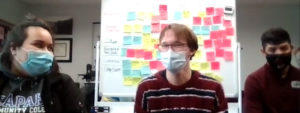Social Emotional Redesign Network Opens Pathways for Student Activation
February 18, 2021
By Susan Paulsen, CEI Strategic Communications Manager
Over the past few years, several Colorado high schools have been participating with CEI in the Social Emotional Redesign Network (SERN), engaging in networking and shared learning, acquiring comprehensive social emotional development content, and partnering with their students to build empathy. Thanks to support from The Colorado Health Foundation, these schools are actively building inclusive cultures that are psychologically and identity safe, relationship rich, and incorporate multi-tiered systems of support for struggling students and staff.
One of these schools is in the southeast corner of Colorado, where more than two dozen school districts serve small, close-knit communities. The town of Swink, home to less than 1,000 people, lies between Rocky Ford and La Junta. Swink School District serves about 350 students in one building; the elementary school district is located in one wing, and the middle and senior high grades are served in another wing. The administrative offices for the district are also housed in the building.
K-12 Principal Lauren Votruba takes pride in the collaborative efforts, including SERN, that have led to increased student engagement and success. Swink Elementary School was named a National Blue Ribbon School by the U.S. Department of Education in 2020, an ESEA Distinguished School and National Title I Distinguished Schools in 2019, and has received Colorado’s John Irwin Schools of Excellence Award for the past three consecutive years.
Votruba’s leadership incorporates a multi-faceted approach that includes purposeful K-12 professional development, continuous improvement cycles, family engagement, and a keen focus on school culture. In 2017, the district joined the SERN to strengthen their ability to provide a culture and climate that meets students’ social, emotional, and academic needs.
“It was my first year here, and at first we thought maybe it might be too much,” Votruba said. “Then we started looking at the high school and seeing pockets of kids who didn’t feel included or were not successful, so we decided if somebody is going to provide resources and give us some ideas on how to improve that culture, then we need to do it. When we started out, I was kind of scared because we’ve only done teams of teachers in the past, and when CEI asked for students on the team, I was a little hesitant at first, but it’s been the best group!”
Anisa, Kyle, and Matthew are three seniors who have been part of the SERN team for more than a year, and despite being unsure how the team would work, they have discovered their own potential for becoming leaders and using their voices for change.
“I think it’s been really healthy for all of the people involved,” Matthew said. “One of the main ideas I’ve seen in my head since we started doing SERN is having students become more connected with each other and becoming more of a unit as a student body.”
Amplifying Student Voice
Matthew’s vision is becoming closer to reality. Last year, the high school’s SERN team consisted of five teachers and five students. In January, they decided they needed additional representation from the freshman, sophomore, and junior classes, and added additional students to their roster, which now includes two kids from each grade level.
Votruba said “We wanted representation for each high school grade level. We also wanted to add kids who may not be involved in other activities. Now the group has a really good mix of kids. It’s fascinating, because they all have unique opinions, and when you bring up a topic, different things stand out. That’s what makes the team so enjoyable and capable of making change – we see a lot of different perspectives.”
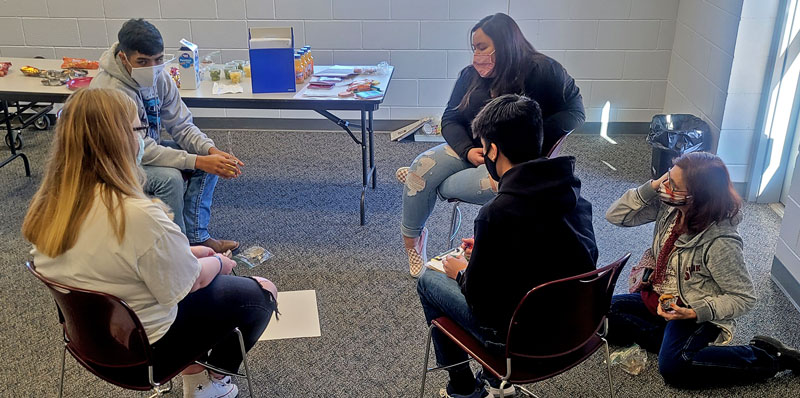
The newly-expanded team held a retreat in January to get to know each other and think about their roles. The seniors facilitated the meeting and led activities that included circle time, team building, and the true colors assessment. “We asked some students who aren’t really involved in sports or other activities to be a part of our SERN team, and at the retreat it surprised me to hear the input they have to help us do better and to help us reach other students like them, as well as students that are involved in clubs and activities,” said Kyle.
Votruba is impressed with the students’ leadership and the participation level of team members. “They’re not intimidated when they are in a room with teachers and administrators, and so they share honestly – we couldn’t do the work if they weren’t honest, so that’s been really nice, and the seniors have kind of led the way.”
Cultivating Relationships to Elevate Impact
A strong focus on team building during the retreat made space for the kids to get more comfortable, share ideas, and build relationships stronger, creating a level of trust necessary to be successful in the work the team is planning.
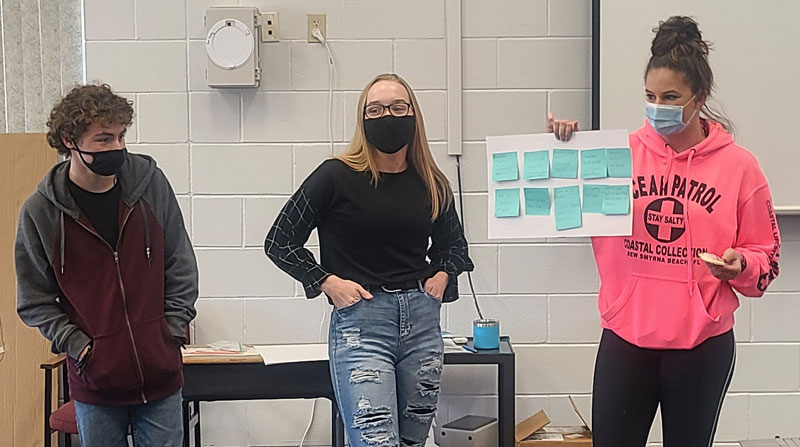
An established component of the SERN team is an advisory committee composed of students. The committee gets together once a month to plan events for the high school advisory time that is held at the end of each school day. Two days a week are designed around homework, grades, and ensuring that academic help is available for those who need it. The remaining days are dedicated to relationship development and team building. Advisory activities include exploration of career goals and planning, stress breaks, outdoor activities, and themed events.
Votruba said the student team members have a variety of ideas for advisory time. “Before COVID, we would get the entire high school together for challenge days, with things like Minute to Win It games. As it gets warmer, I think we’ll be able to go back outside and do some more of that – that’s what they want … the camaraderie and the opportunities to be competitive in a nice way. We do a stress break once a month where we have coloring, puzzles, games, hot chocolate or ice cream bars, football, and other games outside … and students can choose for that 30 minutes of time what they want to do. We do a Random Acts of Kindness Month in May during advisory, where for example, some high schoolers will opt to visit the elementary students and help them with an activity, play a game, or read books.”
At the retreat, students reviewed the school’s results from a recent YouthTruth survey. Votruba asked them to consider what trends they noticed, what was surprising, and to identify the top three themes that the group would like to explore further. As a result, the team now has three action plans in place to address the areas that were of highest concern among the high school’s students: Welcoming/onboarding for incoming freshmen, college/career readiness, and building relationships, including the goal of every high school student feeling that they have a trusted adult in the building.
Room for Growth
While the SERN team is composed of high school members, Swink has partnered with CEI to do additional work related to continuous improvement and social emotional academic development – these efforts are the norm for grades K-12. “Our elementary school is killing it – most of our teachers do circles every day; they’ve got the skills to balance peer relationships,” Votruba said. “We’ve had a huge focus on continuous improvement, with the viewpoint that although we are good, it doesn’t necessarily mean that we don’t have room for growth.”
“I have kids who are involved in so many things outside, and they are starting to bring it inside the walls,” Votruba said. “They come and talk to me about their ideas. For example, I was asked ‘Hey can we come to the board meeting? We want to share everything that’s happening at school,’ and so every month we try to highlight a different group of kids, and they come and give a board report.”
Votruba knows that when she and her team listen to the concerns of students it empowers them to speak up and share their perspectives. “That’s really where the power comes in,” she said. “If you take what they’re saying and you do make changes, or you do address some of the concerns they have, you just went to the top of their list and their viewpoint becomes ‘wow, they do care and they are listening, and we are going to make a difference.’ It’s really fun to see the kids start to take ownership and I hope that continues to grow, because I would love to see kids take ownership in their learning to a level that changes the education system.”
Anisa feels that the SERN team is giving students a path to taking ownership. “I really enjoy being part of this team, and I think the other members also enjoy being part of it, because it gives us, as the student body, a voice. It just makes us all feel better, all together – it feels like we’re actually being heard; we have a purpose to be in this group,” she said.
Votruba is also cultivating the voice of school staff members.
“I do a lot of whole-staff activities; I bring SEL into how I relate to others as a model for how they can relate to kids. I basically do a circle question every week in my weekly email to staff. I have building leadership teams that meet monthly. Different groups of people are on committees where they talk about many different things, and so they feel empowered,” she said.
The school incorporates use of the continuous improvement model, which includes making space for innovation and change, which also leads to empowerment. “If you know the solution and it’s something that you can do, then do it,” Votruba emphasizes, adding, “if you have the resources and you have the ability to change whatever you want to change, then you need to change it – you need to do it. I’ve created an environment of risk-taking; I’ve had teachers come and say ‘Hey, I want to try this,” and I say ‘Do it. As long as kids are safe, give it a shot.’”
Teachers understand the benefit of having relationships, innovation, and continuous improvement defined as priorities. Votruba believes that when COVID and the associated challenges arrived, Swink was more prepared than other districts. “We’ve been doing the work. Our teachers know how important relationships are; they know that academics come after you’ve met the social emotional needs of students.”
The SERN Network is instrumental in guiding Swink in a direction where kids feel valued and connected to the school community, according to Votruba, but she knows there is progress yet to be made. “I still think there are outliers, and reaching all of the outliers can be hard, but I know that nobody is flying under the radar here,” she said. “We have people that check in with everybody. We have advisories for a reason. We have staff that is hyper-aware … we’ve been even more hyper-aware because the depression rate has skyrocketed among kids because of the pandemic situation, the current times.”
The Swink team regularly incorporates strategies to provide reasons to be joyful.
“What we’ve been trying to do, even if it is small and insignificant on our end, can make a huge difference on the other end. Each month we will do something, like getting Extra gum and saying ‘hope you have an Extra special day’ – it’s the little things. We’re going to have each elementary grade adopt an athletic team and help build them up, putting something on everybody’s lockers, for example. There’s so many little strategies.”
Participation in SERN is positioning the district to continue the work after the program concludes. Votruba holds a commitment to the vision that collaboration and relationships, among and within the faculty and student body will lead to increased confidence and success for students.
“My vision around this work is that kids run to the building ready to see what the day holds. That you witness the visitors coming in and they’re overwhelmed by a sense of belonging. You want kids to graduate and then keep in touch with you, and to know that you made an impact on their lives, whether it’s me, or anybody here. I just want to give them opportunities so they have all the information they need to be successful when they walk out of the doors here at Swink, and know that while they were here they were safe, and they were loved.”
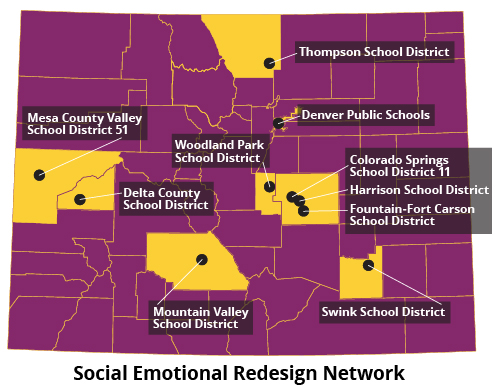 To improve mental health, well-being, and resiliency for adolescents in Colorado, the Colorado Education Initiative (CEI) partners with high schools in across the state to strengthen the ability of educators and schools to provide a culture and climate that meets students’ social, emotional, and academic needs in its Social Emotional Redesign Network (SERN).
To improve mental health, well-being, and resiliency for adolescents in Colorado, the Colorado Education Initiative (CEI) partners with high schools in across the state to strengthen the ability of educators and schools to provide a culture and climate that meets students’ social, emotional, and academic needs in its Social Emotional Redesign Network (SERN).
For more information, contact Amy Spicer, aspicer@coloradedinitiative.org.
